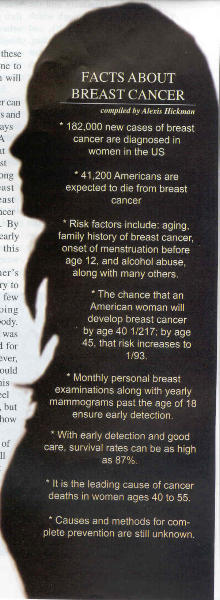Alexis writes about cancer

FAMILY LIFE UNALTERABLY CHANGED WITH CANCER DIAGNOSIS
by ALEXIS HICKMAN
They only had to tell me once. It hung in the air. The fact that something like this was happening to our family was incomprehensible. The words were understood, but the meaning wasn't. Breast cancer, what did that mean?
The chance that an American woman will develop breast cancer by age 40 is one in 217; by age 45, it is one in 93. And if a woman reaches the age of 85, she has a one in eight chance, according to the National Cancer Institute. The American Cancer Society estimates each year about 182,000 women are diagnosed with invasive breast cancer in the United States.
One out of eight women. If you know eight girls, one of them will have cancer by the time she is 85, or, more likely, before. Second only to lung cancer, breast cancer is the leading cause of cancer death in women. This year, 41,200 women will die from breast cancer.
Warning signs are usually a lump, or tumour, in the breast. Tumours form when cells are overproduced and they form a mass of excess tissue. The area becomes red and sensitive. While some breast tumours are benign and not serious, malignant tumours can invade and damage nearby tissue and spread easily to the rest of the body causing a life-threatening situation.
When I found out that my mom had cancer, I had no idea what it entailed. I learned that she would have to go through eight weeks of chemotherapy, and then surgery followed by weeks of radiation. She told me she might lose her hair, eat less, get tired easily, lose weight and just be generally broken down. She wouldn't be able to do many of her normal activities like going shopping, going out to dinner, or during the worst periods, teach her classes.
I went from knowing very little about this condition of cancer to having my life revolve around it. Cancer takes over a victim's life, weakening them until the can no longer go on with daily life.
I still remember the day I found out. It had been a long day of classes and I was waiting after school for a late softball game. The game didn't start until seven so I had to hang around school all afternoon. When I checked my hand phone, I saw I had a message from my dad. He wouldn't be able to pick me up. He is often busy so I didn't think much about it. I didn't think of it again until I got home and found my parents sitting at the dinner table with tear-streaked faces. They sat me down, and talked to me about what it meant for my mom to have cancer. My head was spinning and I knew that everything in our lives was irrevocably changed.
Since my mom was diagnosed, our once-happy home of three has grown troubled. Each ache or pain from my mom can mean something different. A throbbing leg turned into a thrombosis that left my mom with a serious limp.
The cancer reaches into every corner of a victim's life. It leaves them as only a shell of what they used to be. My mother no longer leaves the house without a hat to cover what the cancer has done to her hair. She constantly takes pills and drinks nutrient shakes, just to make it through the day. Her few laughs and frequent coughs are accompanied by pain because the port inserted into her chest for chemotherapy is constantly inflamed.
The effect of the chemotherapy, the cure, seems to be just as bad as the disease. Chemotherapy does wonders in killing the cancerous cells, but this potent chemical formula diminishes the body's ability to produce the white blood cells; the loss of white blood cells leaves the victim's immune system vulnerable to other sickness. Mom constantly fights colds and coughs that make her condition worse.
Our family life revolves around her treatments and progress. My waking moments are spent worrying about what the next doctor's report will reveal.
This whole experience has helped me to put my life into perspective. Such a drastic and life altering even makes daily happenings seem trivial. A quarrel with a friend, or a "C" on a math quiz suddenly doesn't seem to have the impact it used to. Whether or not my mom will be subjected to further treatments, or how invasive her surgery will have to be are what really matters.
Although our outlook is often bleak, there is some hope. With early detection and treatment, the survival rate can be as high as 87%. I know that our will be one of these 87%, our family will be the one to defy the disease, and my mom will live to tell about it.
Being diagnosed with cancer can cause a victim to feel defenceless and helpless. However there are ways to prevent breast cancer. A healthy lifestyle with a low fat diet and regular exercise is a first step. Yearly mammograms along with monthly personal breast examinations can detect breast cancer early on. The earlier cancer is caught, the easier it is to cure. By learning about prevention and early detection, the prevalence of this disease can be reduced.
At the onset of my mothers' cancer, I thought it was necessary to keep it a secret. I confided in a few friends about what I was going through and kept if from everybody. People probably wondered why I was so easily upset, and why I cried for the most trivial of reasons. However, it became clear to me that I would like to inform others about this situation, not to make anyone feel sorry for my mom or our family, but to give them a perspective on how serious this disease is.
It has been a rough couple of months for my mom, and it will get rougher, but this time next year I know we will be a happy healthy family again.
by ALEXIS HICKMAN
They only had to tell me once. It hung in the air. The fact that something like this was happening to our family was incomprehensible. The words were understood, but the meaning wasn't. Breast cancer, what did that mean?
The chance that an American woman will develop breast cancer by age 40 is one in 217; by age 45, it is one in 93. And if a woman reaches the age of 85, she has a one in eight chance, according to the National Cancer Institute. The American Cancer Society estimates each year about 182,000 women are diagnosed with invasive breast cancer in the United States.
One out of eight women. If you know eight girls, one of them will have cancer by the time she is 85, or, more likely, before. Second only to lung cancer, breast cancer is the leading cause of cancer death in women. This year, 41,200 women will die from breast cancer.
Warning signs are usually a lump, or tumour, in the breast. Tumours form when cells are overproduced and they form a mass of excess tissue. The area becomes red and sensitive. While some breast tumours are benign and not serious, malignant tumours can invade and damage nearby tissue and spread easily to the rest of the body causing a life-threatening situation.
When I found out that my mom had cancer, I had no idea what it entailed. I learned that she would have to go through eight weeks of chemotherapy, and then surgery followed by weeks of radiation. She told me she might lose her hair, eat less, get tired easily, lose weight and just be generally broken down. She wouldn't be able to do many of her normal activities like going shopping, going out to dinner, or during the worst periods, teach her classes.
I went from knowing very little about this condition of cancer to having my life revolve around it. Cancer takes over a victim's life, weakening them until the can no longer go on with daily life.
I still remember the day I found out. It had been a long day of classes and I was waiting after school for a late softball game. The game didn't start until seven so I had to hang around school all afternoon. When I checked my hand phone, I saw I had a message from my dad. He wouldn't be able to pick me up. He is often busy so I didn't think much about it. I didn't think of it again until I got home and found my parents sitting at the dinner table with tear-streaked faces. They sat me down, and talked to me about what it meant for my mom to have cancer. My head was spinning and I knew that everything in our lives was irrevocably changed.
Since my mom was diagnosed, our once-happy home of three has grown troubled. Each ache or pain from my mom can mean something different. A throbbing leg turned into a thrombosis that left my mom with a serious limp.
The cancer reaches into every corner of a victim's life. It leaves them as only a shell of what they used to be. My mother no longer leaves the house without a hat to cover what the cancer has done to her hair. She constantly takes pills and drinks nutrient shakes, just to make it through the day. Her few laughs and frequent coughs are accompanied by pain because the port inserted into her chest for chemotherapy is constantly inflamed.
The effect of the chemotherapy, the cure, seems to be just as bad as the disease. Chemotherapy does wonders in killing the cancerous cells, but this potent chemical formula diminishes the body's ability to produce the white blood cells; the loss of white blood cells leaves the victim's immune system vulnerable to other sickness. Mom constantly fights colds and coughs that make her condition worse.
Our family life revolves around her treatments and progress. My waking moments are spent worrying about what the next doctor's report will reveal.
This whole experience has helped me to put my life into perspective. Such a drastic and life altering even makes daily happenings seem trivial. A quarrel with a friend, or a "C" on a math quiz suddenly doesn't seem to have the impact it used to. Whether or not my mom will be subjected to further treatments, or how invasive her surgery will have to be are what really matters.
Although our outlook is often bleak, there is some hope. With early detection and treatment, the survival rate can be as high as 87%. I know that our will be one of these 87%, our family will be the one to defy the disease, and my mom will live to tell about it.
Being diagnosed with cancer can cause a victim to feel defenceless and helpless. However there are ways to prevent breast cancer. A healthy lifestyle with a low fat diet and regular exercise is a first step. Yearly mammograms along with monthly personal breast examinations can detect breast cancer early on. The earlier cancer is caught, the easier it is to cure. By learning about prevention and early detection, the prevalence of this disease can be reduced.
At the onset of my mothers' cancer, I thought it was necessary to keep it a secret. I confided in a few friends about what I was going through and kept if from everybody. People probably wondered why I was so easily upset, and why I cried for the most trivial of reasons. However, it became clear to me that I would like to inform others about this situation, not to make anyone feel sorry for my mom or our family, but to give them a perspective on how serious this disease is.
It has been a rough couple of months for my mom, and it will get rougher, but this time next year I know we will be a happy healthy family again.


